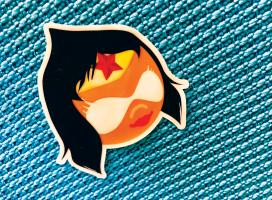The Women of the Drupal Community: Mackenzie Pollock

Collection :
Name: Mackenzie Pollock
Location: Boston, MA
Job Title: Product Owner
With over a million developers, designers, site builders and marketers around the globe, the Drupal community is committed to diversity and collaboration to create the world’s best digital experiences. The more we can do to promote diversity and welcome new voices into the space the more we can create experiences that reflect what people want. While we’ve seen efforts to promote equality in the workforce grow in recent years, gender based discrimination is still a reality throughout many professions, including those in the STEM fields. Our Women of Drupal series recognizes the contributions women have made to the open source and Drupal community and shows the different experiences they’ve had throughout their tech careers.
This month, I had the pleasure of interviewing Mackenzie Pollock, Product Owner at Acquia. Even though she’s only been at Acquia a few months, Mackenzie has made a big impact through the passion and enthusiasm she brings to her team. She believes that success is built from creating strong relationships with the people around you and pushing yourself to learn and listen to the experts (such as those who make up Drupal’s global community) to grow your own skills. In our interview, Mackenzie references the words of late Supreme Court Justice and renowned advocate for equality, Ruth Bader Ginsberg, who believed that women should be fairly represented in positions of leadership. Another RBG quote which I feel encompasses the mission of the open source community as a whole is, “Fight for the things that you care about, but do it in a way that will lead others to join you."
How did you get your start in tech?
I’d have to break it down into two phases. As a personal interest, I’d say it was back in the early 2000s. Before Myspace and Facebook, there was Xanga, and within Xanga you could manipulate the HTML and CSS of the theme to make the front-end your own — that’s where I started coding. I continued more basic coding throughout college at the Rochester Institute of Technology (RIT) and knew this was something I wanted to work with professionally one day.
In November of my senior year at RIT, a friend referred me to SapientNitro, and I ended up landing a position with their Program Management organization before graduation. In May of that year, I received my Bachelor’s degree in Advertising and Public Relations, with a minor in Text and Coding and moved to Boston.
Once there, I was presented with the opportunity to work with a multi-billion dollar consumer packaged goods company as my client. My teams built out new functionality and features for their e-commerce experience, launched numerous brand sites for their subsidiaries and acquisitions and much more. We used a handful of different content management and e-commerce systems, but I always explicitly enjoyed working with CMSs that were low friction to use as a marketer, rather than a technologist.
How did you first discover Drupal?
After working with SapientNitro for a few years, I decided to take on a new role at Monotype as the Product Manager for their re-platforming efforts. Monotype was about to kick off work on moving their five websites over to Drupal as their universal content management system. I was given the opportunity to work with my team to build out the company’s Drupal instance and corporate website and really enjoyed how easy Drupal was to work with. It was extremely customizable, but also had so many features to offer right out of the box. As a marketer, it made migrating and creating new content a breeze compared to the old systems we were working with, and helped my technical team save time whenever we requested new features. We were able to get the first iteration of the website out in a little over four months with a plethora of content, and kept evolving from there.
What are some challenges you've faced, technically or career-wise?
I’ve always seen challenges as an opportunity to learn. One of my personal favorites occurred back at SapientNitro. I took a week off for a vacation down to Orlando with my family in between projects and was sitting in line for a ride at Universal Studios when I got a text from my boss stating that an acquisition with our client was coming, and I had a new project to pick up when I returned. I loved working with this client, so was excited about the opportunity to extend my time with them.
When I returned, I was told that in order for the acquisition to close and the company to go public, we needed to have a new corporate website stood up in five weeks. You can definitely say that a minor panic attack ensued upon hearing this news, but I ended up being so proud of how well the team banded together to push the site out. We were able to nail down the new corporate identity, design the site, create new content, integrate with third-party vendors and launch the site right on time. It was hands down one of the craziest projects I’ve ever delivered, but also one of my most favorites to this date.
Career-wise, I’d have to say that the biggest challenge that I (and many other young women in the tech world) have faced has just been identifying and understanding my worth and value to an organization. Then one step beyond that, I’ve had trouble figuring out how to fight for my own worth. My biggest recommendation I would have for young women in tech would be to do your research and understand the market you’re working in. Spend a good amount of time looking into what other people with your experience are making in your field and ignore gender. Make sure you know exactly what you want (within reason of what the typical salary range for your role is) and practice the art of negotiation to get it. Then start to practice asking for that with your mentors (or peers) and get used to hearing “no” or “why”. Have your case firmed up with clear data points and market research and be prepared to explain. Remember that “no” is the worst thing you’ll hear. Do not be afraid to hear “no”, because there is a good chance that if you do your research and prove your points, you’ll likely hear “yes”. Practice saying “no” yourself, and take emotion out of it. Proving your worth can definitely tug on your heartstrings, but it’s hard to argue with qualified data. Understand what you are capable of, what competitors are offering to those in similar shoes, identify what you want (again, within reason) and fight for your worth.
What inspires you? What keeps you passionate about your work?
Easy. My teammates, peers and mentors. I’m very much a people-person. I love working with teams and problem solving. I believe strongly in servant leadership, and that the most effective way to show your coworkers you care is to be attentive, collaborative and open minded with them. Be willing to roll up your sleeves and jump in to help in any way you can; even if it’s a small tedious task, it’ll likely help them stay on track with their development. The less distraction the better, because the more time they spend context switching, the less time they’ll have to focus on their scope. Know your teams’ responsibilities and boundaries, and communicate them; you cannot expect someone to respect boundaries if they’re unaware of what they are and why they exist. Be humble and respect the fact that people have lives outside of your 9 to 5. Don’t take things personally and understand that you’re not always going to make everyone happy. Treat feedback as a gift and make it known that you’re always open to receiving it. These tips have helped me through the years build strong relationships with my teammates, and ultimately, that’s what drives my passion.
How do you think we can help empower women in tech and work toward better gender inclusion?
Outside of what I mentioned earlier, I believe the best way for women in tech to work toward better gender inclusion is to continue to lift each other (women) up. In the words of Ruth Bader Ginsburg, “Women belong in all places where decisions are being made”; push your organization to ensure that there is diversity (in gender and culture) in recruiting and leadership. Stay up to date with gender equality news and laws, organizations supporting women in tech and get more involved to continue to evolve and expand your network. Never underestimate the impact of sharing kind words with women you look up to; you never know how powerful that small act may be, and how it can fuel other women to continue pushing forward.
What does the future of Drupal look like in your opinion? More adoption, new features, any major changes?
Even though we’ve continued to see great adoption of Drupal, of course I would love to see even more! I’d also like to see less friction for marketers to get a Drupal site stood up with very little coding effort required. Making things more modular, simplifying the management of front-end design, and easing block content management would definitely assist that. The biggest advantage to moving to Drupal is the endless access to the open source community and resources. It is truly invaluable to have a repertoire of technical experts who are passionate about this community and eager to assist right in your back pocket.
What advice would you give your younger self or someone who is just starting out?
Outside of what I’ve mentioned above, just be tenacious about your craft. Be proud to be a woman in technology and inspire others to move into STEM roles. Stay humble and be the type of teammate you’d want to have; never act like you’re above doing the little things that may help your team at the end of the day. Put your team and their well-being first; listen to them and be willing to help.
Take every challenge and piece of feedback as an opportunity to learn; set high goals and standards for yourself and hold yourself to them. Ask as many questions as possible and thank people for their opinions and guidance. Invest time to find role models or mentors who inspire you, and ensure they know how thankful you are for their time and energy. I will never be able to thank my mentor enough for all of the time he’s invested in my professional development and personal growth (thank you, John Sims!)
Get more comfortable with the unknown - this was a hard one for me - you will need to learn how to draw conclusions based on assumptions, basic data and intuition rather than cold, hard facts. It’s okay to say “I don’t know, but I’ll figure it out and get back to you”, just say it with reassurance and confidence.
Make big jumps and do more things that scare you. Always remember and embrace the words of Neale Donald Walsch: “Life begins at the end of your comfort zone.” If you’re too comfortable, it’s time to make a big scary jump.
Be sure to thank your family, friends or advisors who have helped you along the way and never forget where you came from. My mother always told me that she raised her kids to have strong roots and wings; roots to keep us grounded, and wings to lift us to our highest potential. Remember that everyone was junior in their role at one point; recall what it was like for you to be in those shoes and treat others the way you would have wanted to be treated. And most importantly, be kind and patient to one another; the world is a very tense place right now and there are never too many opportunities for us to practice being decent human beings.
---
Everyone who contributes to Drupal, whether that’s through code, content, or anything else, is part of a global team. Building a more inclusive community begins by ensuring that people from all backgrounds have access to opportunities for education and career development. This is why Acquia is honored to have Kimberly Bryant, Founder and Executive Director of Black Girls Code as our keynote speaker at Acquia Engage 2020. Register for Engage and learn more about the work Kimberly and her organization are doing to introduce girls of color to the field of technology and computer science.

